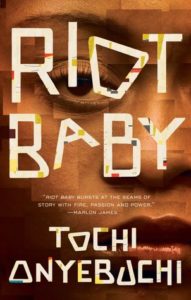
Tochi Onyebuchi’s Riot Baby drew almost unanimous praise last year in my corners of the sci-fi/fantasy internet, being hailed as a powerful and timely exploration of race in America. Unsurprisingly, it garnered plenty of award consideration, and my journey through the Hugo Award Finalists for Best Novella proved a convenient time to pull it off the shelf.
Despite having heard so much about the novella, I came in with very little sense of what to expect from a plot perspective. I didn’t even realize that the title referred to one of the protagonists being born during a riot, for all that it makes sense in hindsight. After reading it, I understand other reviewers’ focus on the tone and the message over the plot, as Riot Baby tells only the loosest of stories. The novella takes place in four parts, with time skips between each, and focuses on Ella and Kev, a brother and sister grappling with Ella’s supernatural abilities and with the difficulty of growing up Black in America. Each section covers a significant part of their lives, but with frequent skipping from scene to scene rather than a straightforward narrative progression. There are major changes in Ella and Kev’s lives, but nothing that feels like an overarching plot driving the story so much as a series of snapshots into lives being buffeted by the world.
The result is a handful of individually powerful scenes punctuating a general feeling of disorientation. Given the rapid jumps back and forth chronologically, interspersed with switches in perspective from Ella to Kev and back, I can only assume that disorientation was among Onyebuchi’s goals in telling the story, with the novella evoking the confusion and powerlessness felt by those at the mercy of a society hellbent on mistreating them. And for some readers, he may have succeeded. Unfortunately, that’s not how I tend to respond to disorientation. In short bursts, it may have power. In a puzzle story, it may drive me toward finding where the pieces fit. But the pieces of Riot Baby didn’t feel like pieces of a puzzle, and the third section in particular lasted long enough to pass over my threshold from powerful into monotonous.
What makes Riot Baby especially hard to evaluate as a whole is that the story crossed back from monotonous into powerful in the fourth part, a chilling dystopia that feels terrifyingly realistic. Were the conclusion reworked into a standalone novelette, or even extended into the centerpiece of its own novella, I strongly suspect it would be among my favorites. But as it stands, following mad scene-jumping of the third section, it feels individually strong but disjointed as part of a whole.
Overall, this is a hard one to score. I’m not convinced that Onyebuchi succeeded in his primary aims, but I also fully recognize that I am not the right sort of reader for this kind of project, and others more amenable to plot-light tales meant to unbalance may see real power. Even so, I do see flashes of brilliance, and I’d love to see future work reminiscent of the novella’s final section.
Recommended if you like: grounded stories of injustice, character over plot, disorienting jumps between individually powerful scenes.
Can I use it for Bingo? I figure you could make a good argument for hard mode of Revenge-Seeking Character, and it also has First-Person POV and is a Book Club book.
Overall rating: 13 of Tar Vol’s 20. Three stars on Goodreads.
